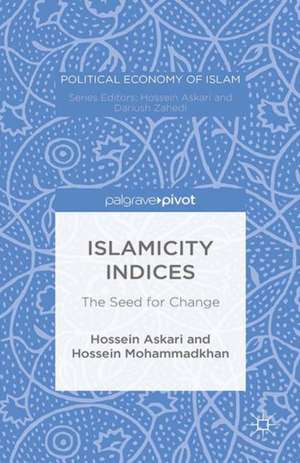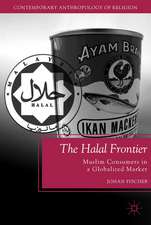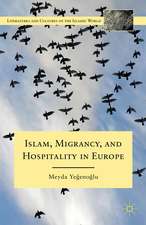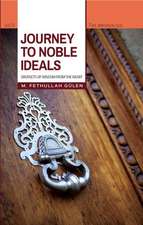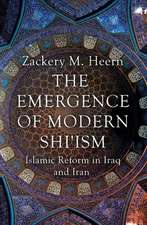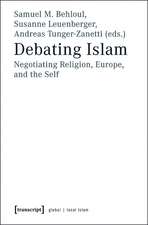Islamicity Indices: The Seed for Change: Political Economy of Islam
Autor Hossein Askari, Hossein Mohammadkhanen Limba Engleză Paperback – 24 oct 2017
| Toate formatele și edițiile | Preț | Express |
|---|---|---|
| Paperback (1) | 443.58 lei 6-8 săpt. | |
| Palgrave Macmillan US – 24 oct 2017 | 443.58 lei 6-8 săpt. | |
| Hardback (1) | 449.74 lei 6-8 săpt. | |
| Palgrave Macmillan US – 19 noi 2015 | 449.74 lei 6-8 săpt. |
Preț: 443.58 lei
Nou
Puncte Express: 665
Preț estimativ în valută:
84.89€ • 87.70$ • 70.65£
84.89€ • 87.70$ • 70.65£
Carte tipărită la comandă
Livrare economică 26 martie-09 aprilie
Preluare comenzi: 021 569.72.76
Specificații
ISBN-13: 9781349995875
ISBN-10: 1349995878
Pagini: 144
Ilustrații: XIV, 103 p.
Dimensiuni: 140 x 216 mm
Greutate: 0.16 kg
Ediția:1st ed. 2016
Editura: Palgrave Macmillan US
Colecția Palgrave Macmillan
Seria Political Economy of Islam
Locul publicării:New York, United States
ISBN-10: 1349995878
Pagini: 144
Ilustrații: XIV, 103 p.
Dimensiuni: 140 x 216 mm
Greutate: 0.16 kg
Ediția:1st ed. 2016
Editura: Palgrave Macmillan US
Colecția Palgrave Macmillan
Seria Political Economy of Islam
Locul publicării:New York, United States
Cuprins
Foreword by Hossein Askari and Dariush Zahedi Foreword by Abbas Mirakhor 1. Introduction 2. Fundamental Islamic Teachings 3. The Indices and their Formulation 4. The Results Islamicity Rankings of All Countries 5. The Seed for Change in Muslim Countries and in their International Relations 6. Concluding Comments Appendix 1: Islamicity Indices for Muslim Countries Appendix 2: Indicators and Sources
Recenzii
"This concise, yet comprehensive, book is a valiant effort to make a difficult subject accessible to the general public and is a must-read for those who wish to pre-empt the Bernard Lewis-Samuel Huntington fantasy of the 'clash of civilizations' from becoming a reality." Abbas Mirakhor, First Holder of the INCEIF Chair in Islamic Finance, International Centre for Education in Islamic Finance, Malaysia
"The attentive public is familiar with the five pillars of Islam, which prescribe how Muslims should behave at the individual level. Much less is known, however, about injunctions by the Quran and the Prophet on the distinguishing social, economic, and political features of the just Islamic order, enabling self-proclaimed 'Islamists' and pundits to fill the void. Askari and Mohammadkhan have rendered an invaluable service by distilling the primary socio-economic and political teachings of Islam in the form of measurable Islamicity Indices. The disparity between what is and whatought to be in Muslim majority countries is sobering, but the Islamicity Indices light the path forward." Dariush Zahedi, Director of the Berkeley Program on Entrepreneurship and Development in the Middle East, University of California, Berkeley, USA
"It is hard to pick up a newspaper today without some mention of Islam or Islamic practices being introduced or expanded in a country. To the uninitiated reader these actions appear to be part of a growing trend in the Muslim world to roll back the secular state and return to an earlier time when religion encompassed all aspects of life. What Askari and Mohammadkhan offer here is a cutting-edge, constructed index to objectively assess policy actions in Muslim countries and differentiate these countries in terms of their seriousness in striving for a society based on core Islamic principles. Traditional efforts in evaluating the extent of societal change brought on by the reintroduction of Islamic teachings have hit a dead end. Byproviding a fresh framework, Askari and Mohammadkhan are opening up a whole new area for scholarship which will enable observers to better appreciate the positive efforts coming out the region as we assess which countries are serious in their efforts versus which are using the trappings of Islamicity to justify other actions." Robert Looney, Distinguished Professor of National Security Affairs, Naval Postgraduate School, USA
"The attentive public is familiar with the five pillars of Islam, which prescribe how Muslims should behave at the individual level. Much less is known, however, about injunctions by the Quran and the Prophet on the distinguishing social, economic, and political features of the just Islamic order, enabling self-proclaimed 'Islamists' and pundits to fill the void. Askari and Mohammadkhan have rendered an invaluable service by distilling the primary socio-economic and political teachings of Islam in the form of measurable Islamicity Indices. The disparity between what is and whatought to be in Muslim majority countries is sobering, but the Islamicity Indices light the path forward." Dariush Zahedi, Director of the Berkeley Program on Entrepreneurship and Development in the Middle East, University of California, Berkeley, USA
"It is hard to pick up a newspaper today without some mention of Islam or Islamic practices being introduced or expanded in a country. To the uninitiated reader these actions appear to be part of a growing trend in the Muslim world to roll back the secular state and return to an earlier time when religion encompassed all aspects of life. What Askari and Mohammadkhan offer here is a cutting-edge, constructed index to objectively assess policy actions in Muslim countries and differentiate these countries in terms of their seriousness in striving for a society based on core Islamic principles. Traditional efforts in evaluating the extent of societal change brought on by the reintroduction of Islamic teachings have hit a dead end. Byproviding a fresh framework, Askari and Mohammadkhan are opening up a whole new area for scholarship which will enable observers to better appreciate the positive efforts coming out the region as we assess which countries are serious in their efforts versus which are using the trappings of Islamicity to justify other actions." Robert Looney, Distinguished Professor of National Security Affairs, Naval Postgraduate School, USA
Notă biografică
Hossein Askari is Iran Professor of International Business and International Affairs, George Washington University, USA.
